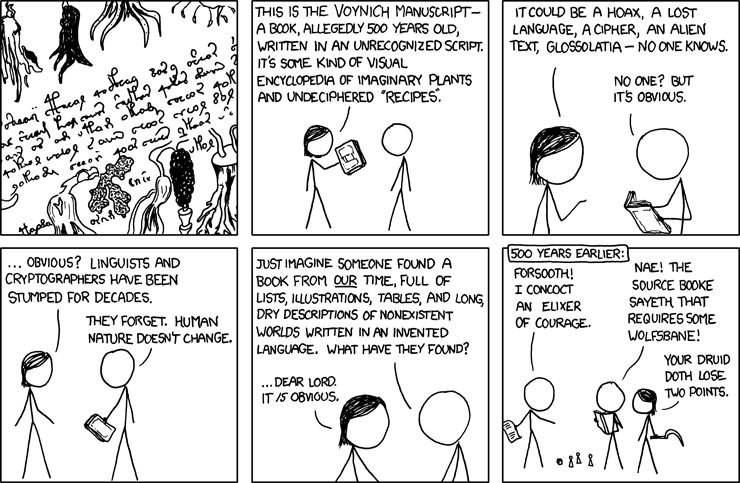593: Voynich Manuscript
| Voynich Manuscript |
 Title text: Wait, is that the ORIGINAL voynich manuscript? Where did you GET that? Wanna try playing a round of Druids and Dicotyledons? |
Explanation
The Voynich manuscript is a very detailed book written in an unknown script, describing plants and recipes, most of which lack a real-world analogue. Over the past few decades, linguists and cryptographers have unsuccessfully attempted to decode the book. A cut out from the book is depicted in the first frame (real or similar).
Tabletop role-playing games (such as Dungeons and Dragons) are fantasy games with extremely detailed descriptions of fantastical worlds. The invented language is probably a reference to The Lord of the Rings in which author J. R. R. Tolkien invented several languages of which Sindarin (Grey elvish), and Quenya (High elvish), are the most famous.
After being shown the manuscript for the first time by Megan, Cueball argues that it should be obvious that it's just an ancient role-playing-game rulebook, since the human tendency to invent fantastical worlds must have also existed in the past. That it is this obvious was again stated when the manuscript was referenced in 1501: Mysteries. In the last panel the book is used, 500 years ago, to play a game similar to Dungeons and Dragons. They speak in the garbled gobbledygook laypeople often produce when trying to imitate "Old English". Which attempts to sound something like early Modern English — which was indeed spoken around 500 years ago. The reference to the real plant Wolfsbane could also be a reference to another invented world, as it is memorably mentioned in the first book of the Harry Potter series.
After concluding this, a shocked Cueball then asks in the title text how Megan got her hands on the original manuscript, which is in the Yale University's Beinecke Rare Book and Manuscript Library. Rigorous security rules now only allow carefully controlled access to materials under video surveillance, thus Cueball's reaction upon realizing Megan has somehow gotten her hands on the original manuscript. He then unexpectedly goes on to suggest the prosaic activity of playing Druids and Dicotyledons, a made-up name (a spoof of the name of Dungeons & Dragons) for the imaginary, hypothetical “game” that the Voynich manuscript could have been the (or one of several) gameplay manual for.
Transcript
- [Weird root vegetables surround a strange script.]
- [Megan holding up book to Cueball.]
- Megan: This is the Voynich manuscript— a book, allegedly 500 years old, written in an unrecognized script. It's some kind of visual encyclopedia of imaginary plants and undeciphered "recipes".
- [Megan points while Cueball opens the book.]
- Megan: It could be a hoax, a lost language, a cipher, an alien text, glossolatia — no one knows.
- Cueball: No one? But it's obvious.
- [Megan continues to talk. Cueball holds the now closed book.]
- Megan: ... Obvious? Linguists and cryptographers have been stumped for decades.
- Cueball: They forget. Human nature doesn't change.
- [Close up of Megan and Cueball - the book is off panel.]
- Cueball: Just imagine someone found a book from our time, full of lists, illustrations, tables, and long, dry descriptions of nonexistent worlds written in an invented language. What have they found?
- Megan: ...Dear Lord. It is obvious.
- [Three people are standing around pawns and a die. One (a Cueball) is holding a sheet of paper, another (another Cueball) is holding a book, the third (Megan) is holding a scythe. At the top of the panel there is a frame with the following text:]
- 500 Years Earlier:
- Person #1: Forsooth! I concoct an elixer of courage.
- Person #2: Nae! The source booke sayeth that requires some wolfsbane!
- Person #3: Your druid doth lose two points.
Trivia
- In the third panel, Randall may have meant glossolalia rather than glossolatia.
- The use of the pronoun "your" in the last frame is anachronistic, as in early modern English it was used as a plural pronoun, or as a singular pronoun only to a superior; the proper pronoun would be "thy": "Thy Druid doth lose two points."
- Elixir is misspelled as elixer.
Discussion
I feel that the title text is not well enough explained, but I don't know if it's enough to add an incomplete tag. 108.162.254.163 03:37, 2 January 2014 (UTC)
It has been proposed that the VM is a token artifact for Francis Bacon's utopian book New Atlantis. Under this theory, it would be akin to a prop replica made in relatively recent times. --I Should Get Out More (talk) 14:43, 18 March 2014 (UTC)
I feel like the Codex Seraphinianus should be mentioned, but I'm not sure how it would fit in. Leafy Greens (talk) 17:05, 16 November 2014 (UTC)
Alternately, Megan could be attempting to distract Cueball from his line of questioning about where she got the book, by suggesting they play a game (possibly with the book), to steer the conversation away from the difficult question of where she got it. 162.158.75.232 15:59, 28 June 2017 (UTC)
Why is Harry Potter part of this explanation? The idea of wolfsbane keeping werewolves at bay isn't anything like that new. --172.69.33.11 18:42, 27 August 2018 (UTC)
Am I the only one that noticed that Druids and Dicotyledons was likely abbreviated as D&D, much like Dungeons and Dragons is today?
It's a funny thought that it would be some old nerdy conlang that leaves various experts "stumped". 172.70.147.130 13:51, 11 May 2023 (UTC)